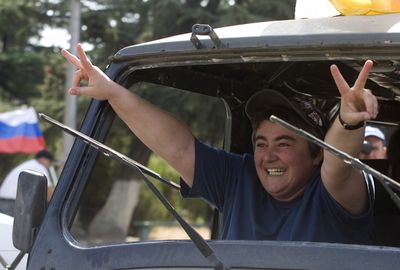Russia embraces separatist enclaves
West criticizes attempt to split Georgia

WASHINGTON – The Bush administration and its European allies, stung by Russia’s formal recognition of two separatist Georgian enclaves, faced new pressure Tuesday to strike back diplomatically and politically against Russia’s widening move to assert its power in the Caucusus.
U.S. officials, who have shunned a military response, did not publicly specify available options. But privately, they cited the possibility of excluding Russia from a number of international institutions, such as the World Trade Organization. They also could try to pressure Russia through economic measures that pinch the wallets or limit the mobility of the nation’s wealthy elite and middle class, including restrictions on travel to the West.
Leading Western European members of the old Cold War coalition reached out Tuesday to reassure former Soviet states following Russia’s recognition of the independence of South Ossetia and Abkhazia. Chancellor Angela Merkel of Germany, in Estonia, said the Russian move “contradicts the principle of territorial integrity.” British Foreign Minister David Miliband planned a visit to Ukraine today.
The Russian recognition of the separatist states came in a pair a decrees by President Dmitri Medvedev, who said on national television they had become necessary because it was clear that the affected people no longer could live peacefully with the Georgians around them after Georgian forces intervened in South Ossetia earlier this month.
“This is not an easy choice, but it is the only way to save the lives of the people,” said Medvedev, who acted one day after the Russian parliament unanimously voted to accept the regions’ requests for independence. Medvedev said later that Russia was willing to risk a new Cold War and that it was the West’s choice whether to loosen its ties.
The U.S. and Europe, while regularly denouncing Russia’s advance in western ally Georgia, have taken few strong measures to counter it to avoid alienating Russia while it could still withdraw its forces to positions it held before sending its forces into Georgia on Aug. 7. But Russian troops now are dug in, and by these decrees, Russia has signaled that it wants to extend its military advance with political gains.
President Bush, whose earlier appeals for restraint were brushed aside in Russia’s latest action, condemned the recognition of the two enclaves as “irresponsible.” In a statement, Bush declared that Abkhazia and South Ossetia are part of Georgia, “and they must remain so.”
“Russia’s action only exacerbates tensions and complicates diplomatic negotiations,” he said.
Bush was joined in the criticism by France, Britain and Germany, who portrayed the Russian move as a substantial escalation of the crisis and setback to hopes that Russia still might withdraw the forces it sent into Georgia.
Russian Ambassador Vitaly Churkin told reporters Tuesday that past U.N. Security Council resolutions affirming Georgia’s sovereignty over Abkhazia and South Ossetia were invalidated when Georgian forces intervened in South Ossetia.
“Their use of force dashed those resolutions,” Churkin said.
Russia is expected to move quickly to increase its military presence in the regions. Leaders of the territories were already talking Tuesday about signing defense agreements with Russia; the South Ossetian president said he would ask Russia to build a military base in the republic.